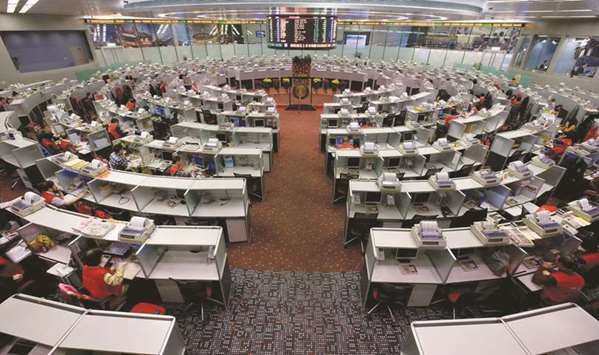Asian markets mostly fell yesterday, with Shanghai and Hong Kong leading the way, with an early rally overcome by simmering concerns about a possible China-US trade war.
Worry over the world economy also sent the dollar up against high-yielding currencies as traders sought out safer bets.
Bargain buyers took advantage of the cheap valuations in the morning after Tuesday’s blow-out that came in response to the world’s top two economies threatening each other with tariffs on a mind-boggling amount of imports.
However, nervous traders turned sellers again as the day wore on, with analysts warning the next plunge could come at any moment, while central bankers voiced concerns about the impact a trade war could have on the global economy.
US traders gave their Asian counterparts a mixed lead, with the Nasdaq hitting a new record close thanks to a surge in tech giants, while the Dow and S&P 500 finished in the red.
Hong Kong and Shanghai – the two were the worst hit by Tuesday’s selling frenzy – were the big losers among major markets.
Hong Kong sank 1.4% at 29,296.05 and Shanghai finished 1.4% lower at 2,875.81.
Singapore shed 0.3% and Seoul lost 1.1%, with Manila and Bangkok also more than 1% lower.
However, Tokyo ended 0.6% higher at 22,693.04 and Sydney gained 1%.
Wellington also jumped more than 1% after data showed that while New Zealand’s economy cooled in January-March, interest rates are not expected to rise in the near term.
Stephen Innes, head of Asia-Pacific trading at OANDA, said markets were “unsure if we’re in the calm after the storm, the lull between storms or even in the eye of the hurricane”.
Trump’s protectionist America First agenda has also seen him threaten tariffs on steel and aluminium from the European Union and on Wednesday the bloc outlined retaliatory measures against several US goods such as blue jeans and motorcycles.
The upheaval has spooked the heads of the world’s central banks, who said Wednesday they were seeing confidence already being hit, forcing them to reconsider their forecasts for growth.
While the US economy is humming, Federal Reserve boss Jerome Powell warned at a European Central Bank conference in Portugal: “Changes in trade policy could cause us to have to question the outlook. “For the first time, we’re hearing about decisions to postpone investment, postpone hiring.”
His remarks were in line with those of his peers including from Japan and Australia, while ECB head Mario Draghi said: “There have been lessons one can learn from the past. They are all negative.”
On currency markets the dollar rose across the board on a flight to safety.
The greenback was sharply up against the Korean won, Australian dollar, Indonesian rupiah and Thai baht.
The New Zealand dollar was also weighed by lower expectations for the country’s interest rates.
The pound continues to struggle as British Prime Minister Theresa May pushed through key Brexit legislation but still faces pressure to pick up the pace of talks with the EU ahead of a planned March withdrawal.
Oil prices were down as a dip in US stockpiles was overshadowed by concerns ahead a key Opec meeting, where kingpin Saudi Arabia and non-member Russia are pushing for an increase in output.
While a hike is expected some members of the cartel are against the move, including Iran and Venezuela who complain the proposed hike is the result of pressure from the United States.
“The market is still in search of some semblance of clarity,” Innes said, but added: “While clarity brings power, I suspect it will also bring waves of volatility as we’re indeed headed for some collision.”

A view of the Hong Kong Stock Exchange. The index sank 1.4% to 29,296.05 yesterday.


